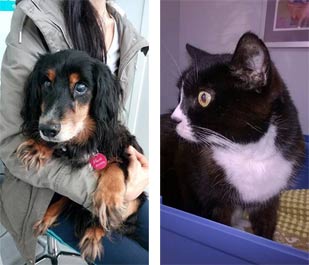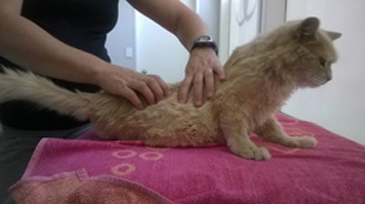
So, your pet has a heart murmur?
At your pet’s last physical examination, your vet told you they’ve heard a heart murmur on your pooch or kitty. So what does this mean and what should you do about it?
First let’s check what a heart murmur is. A heart murmur is the sound of abnormal or turbulent blood flow within the heart. Normally, there are two distinct heart sounds often described as “lub” and “dub”. Together these make the heartbeat: “lub-dub…lub-dub…lub-dub…”. When there’s a murmur, it sounds more like “lub-whoosh-dub” or sometimes just “lub-whoosh” or in severe cases “whoosh…whoosh”.
The turbulent blood flow that causes the murmur is usually the result of some kind of structural change or defect in the heart. In younger cats or puppies for example, it could be a defect that they were born with (called a congenital murmur). In older pets, it is usually a defect that they acquire over time (called an acquired murmur).
Heart murmurs can indicate serious and life-threatening heart disease. Cats are notorious for seeming fine and not even having a murmur and then developing heart failure very rapidly. Heart murmur is also a fairly common sympton in dogs that is often seen and treated in vet clinics. In more severe cases it can be part of distressing conditions both to the dog and the dog’s owner. Heart murmur in pets are not a disease in itself but they can suggest that the animal has an underlying problem that should be dealt with. These are some of the reasons why we, at Ellerslie Vet Clinic, recommend regular preventative care visits and will listen to the heart during every exam.
The vet won’t know why the blood flow is abnormal just by listening to the heart alone. In many cases an echocardiogram (ultrasound) is done in conjunction with an electrocardiogram and chest radiographs. We are fortunate that Dr Kathrin Brinker is an excellent ultrasonographer and that we can perform echocardiograms as well as electrocardiograms and digital X-Rays in our clinic.
Pets can live a long time with heart disease but sometimes it can progress rapidly. To understand more about prognosis, it is important to understand why the murmur is occurring and how far along the heart disease has progressed. Medications and testing are aimed at preventing congestive heart failure. In this end-stage of heart disease, the heart can no longer effectively pump blood to the body and fluid begins to leak into the lungs and/or chest and abdominal cavity making it difficult to breathe. With heart disease in general, your veterinarian’s aim is to help prevent congestive heart failure or sudden heart death for as long as possible.
Maggie, the 13 year old cat and Shanti, the almost 17 year old dog are both patients with heart murmurs but very different diseases causing the murmur. Shanti already had an episode of congestive heart failure due to a disease of her mitral valve and is on three different medications to prevent another episode of this scary and stressful event. At present she’s enjoying spring time and happily spending time out and about with her dog parents 🙂
Lovely Maggie has an acquired heart muscle disease which causes thickening of the heart muscle, which influences the blood flow in her heart, the volumes the different chambers of the heart have to deal with and pressure gradients between the different chambers and over the heart valves. She is coping really well so far and keeps her cat Dad busy managing all the different medications for her various little health issues, which sometimes seems like a full-time job!



Pingback: online article spinner software
Pingback: buy magic mushrooms online australia
Pingback: moving to us from canada with car
Pingback: ป้ายโฆษณา
Pingback: บาคาร่าw88
Pingback: คาสิโน 168
Pingback: buy cake carts
Pingback: เครื่องกรองน้ำโคเวย์
Pingback: fryd carts
Pingback: qiuqiu99 online
Pingback: เว็บ บอล ที่ ดี
Pingback: ตู้ สล็อต 8888
Pingback: alpha88 เข้า ไม่ได้
Pingback: situs toto
Pingback: togel sdyney
Pingback: unicvv
Pingback: bonanza178
Pingback: vig rx
Pingback: Charter guns
Pingback: rohypnols kopen
Pingback: slot88
Pingback: GPI GAME
Pingback: สล็อต ฝากถอน true wallet เว็บตรง 888pg
Pingback: ทินเนอร์ 2K
Pingback: ทินเนอร์คุณภาพสูง
Pingback: Health Insurance Agent
Pingback: 20141 Homes for Sale
Pingback: rajadamnern boxing stadium
Pingback: เว็บแทงบอล
Pingback: peacenewspaper.net
Pingback: skaties te
Pingback: pool villas in phuket
Pingback: ออกแบบฉลากสินค้า
Pingback: สติ๊กเกอร์โลโก้
Pingback: สมัครyehyeh
Pingback: Bilskrotning Uddevalla
Pingback: เพิ่มยอดไลค์
Pingback: togel online
Pingback: therapist nj
Pingback: Night Bazaar Chiang Mai
Pingback: Vape carts for sale
Pingback: Honda 2023 ราคา
Pingback: เกมน่าสนใจ ของค่าย eBET Casino
Pingback: muha carts
Pingback: เช่าเรือสปีดโบ๊ท,เช่าสปีดโบ๊ท เจ้าพระยา,เรือเช่าเหมาลํา เจ้าพระยา
Pingback: gordijnen dubbele plooi
Pingback: Pilates Chiang Mai